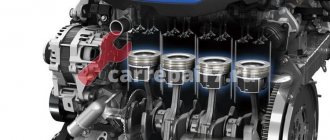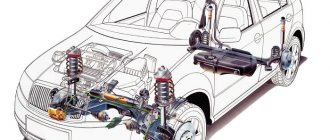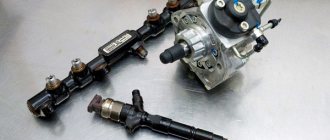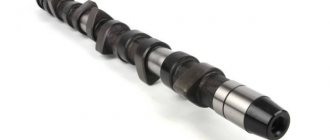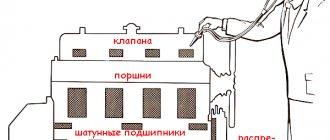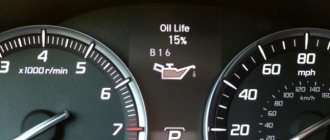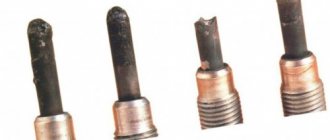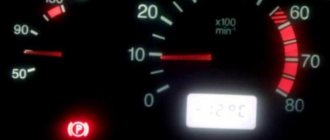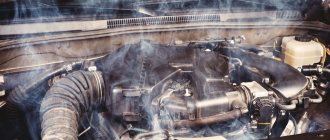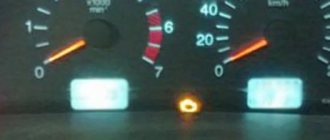02 August 2019 Lada.Online 16 859 1
During operation of the vehicle, a knocking sound may occur in the engine. Most often this is due to serious malfunctions, the cause of which will require disassembling the engine. However, you can try to independently determine the cause of the knocking in order to decide whether to go to the service station on your own or with a tow truck.
Causes of knocking
- First of all, check the thermal clearances , since in most cases not very worn engines lie in them. The valves need to be adjusted.
- The next reason, both in scale and seriousness and regularity, is worn hydraulic compensators . In addition to replacing the hydraulics, it may also make sense to replace the oil and filter.
- The third reason, and so to speak assumption, may be the main liners ; they may already have a gap greater than permissible. And when working in cold conditions, the sound is heard, but with the appearance of oil pressure it disappears. But if the oil pressure jumps at all, then there is a problem with the oil pump.
- A knock can also come from the timing mechanism , when the gaps in the beds increase, and as they warm up they subside. Especially noticeable in the cold season.
- And finally, the most terrible problem associated with knocking can be a defect, wear of the piston (at first they dangle, the skirt rattles, and then it can even end with the skirt breaking) or the rings are worn out.
But be that as it may, it is impossible to neglect the knocking coming from either the engine or the chassis; the most unpleasant situations can happen at the most inopportune moment, therefore, at the slightest suspicion, you need to put the car in for repair to determine and eliminate the cause of the malfunction!
Subscribe
to our channel in
Index.Zen
Even more useful tips in a convenient format
Regarding a knock that appears in the engine, the driver is most often interested in two questions: how much longer can he drive like this and how difficult and expensive can the repair be? In this article we will talk about what to do if the engine starts knocking (cold or hot) and strange noises appear in its operation.
▪If there is a knocking sound in the engine
First, let's figure out what is the reason for the knocking? The answer to this question will easily put everything in its place - both the possibility of further operation of the engine and the degree of complexity of the upcoming repair. Unfortunately, it is not always possible to give an exact answer to the question of what causes knocking in a particular case. Even a highly qualified mechanic can make mistakes. What can we say about ordinary car enthusiasts?
Without disassembling and checking all engine parts and assemblies, it is even more difficult to answer the question why the knocking occurred in the first place? Of course, there are known cases of installation of low-quality components during engine assembly, the rapid wear of which caused knocking. But, as a rule, defects in parts that cause knocking are a consequence of violation of engine operating rules, as well as their natural wear.
▪What are the causes of knocking in the engine?
In the vast majority of cases, knocking in the engine occurs in the area where parts meet when the gap between them increases above a certain critical value. Under conditions of normal lubrication and cooling of parts, increased noise occurs with a gap approximately twice the maximum value of the nominal gap. The knock is detected directly when the gap in the mating is approximately three times or more greater than the nominal one, and the larger the gap, the stronger the knock.
Obviously, engine knocking is the impact of one part hitting another. This means very high loads at the points of their collision. Note that impact loads gradually destroy the mating surfaces, and the faster the greater the impact force. And since this force depends on the size of the gap, as it increases, the wear rate of parts increases. In other words, in most cases, knocking (read: shock loads, clearance, wear) progresses, i.e. getting stronger and stronger.
How quickly this process occurs depends on many factors: design, material, operating loads, lubrication conditions, cooling. Therefore, some engine components can operate in a worn-out state with a knock for many thousands of kilometers. In others, on the contrary: after knocking occurs, parts break down after several hundred or even tens of kilometers.
Causes of engine knocking
The knock itself is formed when one element of the power plant hits another.
At the same time, the noise in the engine varies, it occurs under certain conditions and disappears when they change.
In most cases, knocking is a signal of problems with certain mechanisms - the timing belt, crank mechanism, cylinder-piston group, but they also appear in other components of the unit.
Criteria for the nature of the knock.
Extraneous noise generated in the power plant can be divided into several criteria:
- The power of sound;
- Cause-and-effect relationships;
- Sound (metallic knocking, etc.);
- Cyclicality.
Let's look at each of the criteria.
The knocking sound in the engine may be weak and barely audible - in this case, the car can continue to be used, but it will not hurt to carry out diagnostic work.
There is an average knock that can be heard clearly, but it is not difficult to drown it out, for example, with loud music.
A car with such knocking noises can be used for a short period of time, enough to be able to get to a garage or service center.
Distinct loud sounds coming from inside the power unit indicate significant problems in its operation.
With such sounds, the engine is turned off and the car is delivered to the garage or service only by a tow truck or in tow, since serious problems may arise with the engine.
Cause-and-effect relationships in the occurrence of knocking occur after non-professionals intervene in the power unit.
That is, whether, on the contrary, failure to perform technical work or repairs will lead to engine malfunctions.
Sources of knocking (metallic) in the engine:
- Oil that is not recommended for use on this engine or counterfeit products;
- Poor quality or defective parts that were installed during repairs can also cause knocking in the engine.
- Severe wear of the components will naturally lead to the appearance of extraneous noise.
Types of engine knocks
Experienced auto mechanics can distinguish non-standard extraneous sounds that appear during operation of an internal combustion engine by hearing based on a number of signs:
- The strength of the blows.
- Increasing intensity of sounds.
- Harmonic frequency.
- Cyclicality.
Depending on the strength of the sounds coming from the operating unit, it is recommended to perform the following actions:
- if the impacts are very strong and cannot be damped by any available means, it is best to turn off the engine and deliver the vehicle using a tow to the nearest service station;
- with medium impacts, which are not audible when you turn on music in the car interior, it is allowed to slowly move independently to the repair shop;
- It is possible to diagnose the cause of the impacts not immediately if the noises coming from the internal combustion engine with the hood open in conditions of complete silence are barely audible.
Trick knockers
In addition, there is such a thing as “deceiver” knocks.
The essence of this concept is that a knock that seems to accurately indicate a certain malfunction has a completely different nature.
For example, when a diesel engine creates a load, a loud knocking sound appears, signaling problems with the crank mechanism. But the same knocking noise occurs with this engine when there is a malfunction in the power system.
Or, over time, a loose crankshaft pulley will begin to make sounds very similar to the knocking of the crankshaft itself, so it is important to first determine what exactly was the source of the extraneous sounds.
In any case, the occurrence of extraneous noise should not be ignored and professional diagnostics cannot be avoided.
Primary diagnosis of engine knocking
To make sure that unusual sounds are coming from the motor, you need to:
- install the vehicle above an inspection hole or on an overpass;
- depress the clutch pedal;
- disconnect the engine from the gearbox and transmission;
- check the condition of parts and components that are the most likely culprits for the appearance of extraneous knocking noises (engine mounts, water pump, generator, etc.);
- dismantle parts that cause suspicion;
- If the unusual sounds do not stop, this means that the main problem is in the motor itself.
Extraneous knocking noises when the engine is idling
Let's look at the causes of knocking in the engine under different operating modes.
First, let's look at the reasons for its occurrence at idle.
Here you first need to determine the behavior of the knock in the future.
Thus, a slight knocking sound in the engine at idle, emanating from the middle part of the engine, having a uniform intensity, while the sound intensity decreases somewhat with increasing speed, presumably indicates that small third-party parts or debris from parts have entered the cylinder.
This problem is eliminated by removing the block head and removing foreign objects.
The same knock, but increasing with increasing speed, signals wear of the cylinder-piston group, damage to the piston skirts due to overheating.
This malfunction can only be eliminated by replacing the cylinder-piston group.
The appearance of a similar noise, but with half the intensity, and heard in the upper part of the unit indicates a violation in the operation of the timing belt.
If a knock is present not only in idle, but also in other modes, this indicates wear on the camshaft and a violation of valve adjustment.
If the thermal gap is adjusted using hydraulic compensators, then the knocking noise as the speed increases, as a rule, decreases.
But this indicates a malfunction of the hydraulic compensators.
Problems with the cylinder head are solved by removing the valve covers, determining the source of the sound, replacing worn elements or adjusting the clearance.
A uniform knocking sound, significantly increasing with increasing speed, if it comes from below, this indicates the destruction of the balancer shaft bearings, the beginning of the destruction of the connecting rod liner, and deformation of the connecting rod itself.
These are some of the most dangerous causes of noise.
If at idle you hear an uneven sound that completely disappears as the speed increases, this is a signal of problems with the bearings of the engine attachments, for example, a malfunction of the pump bearing.
A muffled, uneven knock that appears at idle and disappears as the speed increases indicates that the permissible oil level has been exceeded due to working fluids or fuel getting into it. In this case, an internal breakdown of the cylinder head gasket occurred and antifreeze began to flow into the oil.
All of the above malfunctions, except for destruction of the connecting rod bearings and balance shafts, are generally not very dangerous; the driver has the opportunity to deliver the car under its own power to a service center or garage.
Technical causes of knocking in the engine
During the long-term operation of a vehicle, a large number of defects and malfunctions arise, which often cause noise effects and unusual sounds that cause justified anxiety among drivers. Among the numerous signs and causes, the most likely factors include:
- Engine detonation, accompanied by a characteristic metallic knock.
- Failure of motor elements due to wear.
Detonation explosions occur due to failures in the distribution of air-fuel mixtures in the cavity of the working cylinders. Instead of uniform combustion, the fuel explodes, causing the cylinder walls to become deformed and the pistons to fail.
The main causes of engine detonation:
- a large accumulation of a thick carbon layer in the lower part of the piston and on the cylinder walls, which leads to an increase in the compression ratio of the fuel mixture;
- failure to regulate the moment of fuel ignition;
- fuel of inappropriate quality is used;
- malfunctions, failure of spark plugs;
- failure to comply with the operating conditions of the vehicle, which leads to additional loads on the internal combustion engine;
- overheating of the elements of the cylinder-piston group;
- malfunctions of components and parts of the exhaust system.
Tip: To minimize the incidence of engine knocking, it is not recommended to use the acceleration mode when overcoming steep inclines.
If knocking in an internal combustion engine is caused by wear, the reasons should be sought in the following:
- Failure of valve springs.
- Increased wear of the camshaft cam mechanisms.
- Faulty bearings - main bearings, connecting rod bearings, which support the crankshaft, increasing clearances.
- When the pistons wear, the gaps between the rings and cylinder walls increase.
- Wear of the distribution system parts leads to an increase in the gaps between the cams and the drive, and the timing belt begins to sag.
If no obvious wear of engine components is detected, but knocking is still present, this means that:
- the parts are located with some distortion and work with jamming;
- nodes are deformed;
- the viscosity of the motor lubricant does not correspond to the declared characteristics; a protective oil film does not form on the metal surfaces of the rubbing parts.
Engine knocking when cold
An uneven sharp metallic knocking sound when cold, intensifying as it warms up, indicates:
- Turning of the connecting rod bearing around the axis or its destruction;
- Significant wear of the main liners, deformation of the crankshaft journals. In this case, the sound comes from the bottom of the motor;
- It is possible that sound may occur in the middle part of the engine due to significant wear of the mounting holes of the piston pins; it usually appears with a sharp increase in engine speed.
Many of the noise sources described are also typical for the engine operating conditions described below.
Engine knocking at idle
If it is noticed that the knocking sound of the internal combustion engine occurs when idling, and when the accelerator pedal is pressed, the sound becomes stronger, it is necessary to urgently diagnose and repair the power unit. Most often this is caused by a failure of valve adjustments. Among motorists there is an expression “valve knocking”. This means that the gap between the camshaft cams and the control arms of the drive mechanism has not been adjusted.
In order to prevent the appearance of characteristic metallic knocks, it is recommended to regularly adjust the valve clearances. Recommended timing is after each run of 10 - 15,000 kilometers.
Knock at low speeds
A knocking sound in the engine at low speeds when the engine is not warmed up, if it comes from the top, indicates problems with the hydraulic compensators.
A uniform knocking sound in the upper part, which intensifies significantly when warming up, signals the beginning of destruction of the valve seat.
It is worth considering the possibility of damage to the bearings of attachments.
It is also possible that the valve timing is disrupted due to the timing belt slipping, as a result of which the piston bottoms come into contact with the valves, hence the knocking sound in the engine.
Filling with low octane gasoline can lead to detonation in the engine, which is why knocking occurs.
If you detect extraneous noise while the engine is running cold at low speeds, it is better to immediately try to determine where exactly the noise is coming from.
Third-party sounds on startup
Engine knocking during startup most often occurs due to malfunctions in the lubrication system.
Poor performance of the oil pump, insufficient amount of oil and clogging of the channels with pollutants leads to the fact that the oil does not have time to reach all the rubbing surfaces in time, which is why grinding and knocking noises are heard.
Due to problems with the lubrication system, oil does not flow into the hydraulic compensators, without which they begin to knock.
If noises appear during startup, it is advisable to stop the engine and check the oil level. If necessary, bring the level to the desired value.
If this does not help, you can change the oil and pre-flush the system.
Next, if the knocking noise persists during startup, you need to check the condition of the oil pump.
Characteristics of engine knocks
The sounds coming from an internal combustion engine vary in harmonics. They are voiced and deaf.
A characteristic metallic knock is heard in the engine if:
- There is contact between parts rotating at high speed.
- The material of their manufacture is carbide steel.
- If there is no high-quality lubricant when mating them.
A dull knock in the engine is heard under the following conditions:
- Interacting parts are made of steels of varying hardness.
- Small amplitude of movement of associated elements.
- At the points of their interaction there is a damping (shock softening) layer of lubricant.
Important: A loud knocking sound in the engine coming from the top of the power unit indicates beating of the valves. Sounds that resemble rustling are caused by problems with the timing belt (gas distribution mechanism). Pistons and cylinders make medium or low-pitched knocking noises.
Causes of sounds when hot
Knocking in the engine when “hot” can occur for all of the above reasons.
In any case, it is important to determine the nature of the extraneous noise, the approximate place where it is coming from, and then take action.
Almost always, in road conditions, it will not be possible to eliminate the malfunction; the car will need to be delivered to the repair site to accurately determine the cause.
But preliminary diagnostics will tell you which way the car will have to be delivered.
If there is a knocking sound at the top, you can drive the car under your own power, but check the oil level before doing so.
A sharp sound from the bottom of the engine will indicate a problem with the crank mechanism, which is why the car must be delivered by a tow truck.
Features of knocking in the engines of VAZ cars
The described causes of third-party noise are typical for all engines, including VAZ models.
In addition to the above sources of the problem in classic models, knocking in VAZ engines can be caused by a strong stretch of the timing chain or a weakening of the chain tensioner.
And for models starting from the VAZ 2108, additional increased noise may occur due to wear of the belt tensioner bearing.
Diesel engines, additional possible sources of knocking.
If a diesel engine knocks, in addition to problems with the crank mechanism, cylinder-piston group and timing, the knock can be caused by problems with the power system, in particular, malfunctions with the injection pump, turbine or injectors.
Or a violation of the timing of fuel injection.
Possible causes of knocking in the engine
To accurately find the cause, a qualified inspection of the internal combustion engine is necessary using special diagnostic equipment. The main reasons that occur most often:
- Defects received during the manufacture of a car (on a new car).
- Poor quality repairs (for example, in a regular garage).
- The engine crankcase is filled with the wrong brand of engine oil.
- Using low-quality gasoline or diesel fuel.
- Violation of vehicle operating rules (motor overload, aggressive driving, etc.).
A knocking sound appears in the engine for no apparent reason; this occurs after a long run, as a result of gradual wear of working units and parts exceeding the maximum permissible values. If unusual sounds occur, the technician must make sure that it is not the gearbox or other transmission mechanism that produces them, but the engine. Based on the nature of the sound, an experienced mechanic determines the location and degree of complexity of the breakdown. This applies to internal combustion engines of any type: carburetor, injection, diesel.
Sound diagnostics
If a problem arises that the engine is knocking, as already said, it is first of all important to determine the nature of the knock, as well as the location of its occurrence.
Some of the reasons can be diagnosed without disassembling the power plant.
Thus, a special device - a technical phonendoscope - will allow you to more accurately determine the location of the noise.
Using it, the engine is listened to and it is determined in which mechanism or system malfunctions have occurred.
You can also use more advanced equipment, for example, a motor tester.
A simple procedure will allow you to determine the destruction of the connecting rod liner.
It is done like this: with the engine running, when a loud knocking noise appears, the high voltage wire is removed from the spark plug one by one on each cylinder.
If the fault lies in the connecting rod bearing, then disconnecting the wire on the cylinder that has the problem will significantly reduce the knocking noise.
If noise occurs, when there is a suspicion of destruction of the bearing of any attachment, you can determine which equipment has problems by disconnecting their drive from the on-board network.
If after this the extraneous noise disappears, the faulty equipment is replaced or sent for repair.
Knocks at the top of the engine.
They are diagnosed sequentially. First, the condition of the cylinder head elements and their fastening is checked.
Then the valves are adjusted or the hydraulic compensators are washed. At the same time, the level and condition of the oil are checked.
Then the head is removed from the engine and a full range of restoration work is carried out.
Middle and lower part of the engine.
An accurate determination of the sources of knocking in the lower part of the engine is possible only after disassembling the engine.
Since severe wear of the cylinder-piston group also causes unwanted sound, therefore, if a knock occurs in the middle part, the condition of this group can be assessed by measuring compression.
If the knock is caused by detonation, its presence can be determined by the behavior of the power plant.
If it continues to work for some time after a forced stop, there is detonation in the cylinders.
Diesel power plants.
Diagnostics in these engines is carried out identically to those described, but their fuel system can be diagnosed only after removing its elements and only on special stands.

